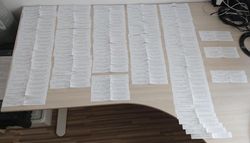How to Prepare for the CAPM Certification Exam
"Wait, aren't you a software developer?"
If it's not your first time on my blog, you might be thinking: "Aren't you a prominent software developer, not a project manager?" Ok, maybe without the prominent part. But yes, you are right. I started working as a developer a few years ago. And I enjoyed writing code. What I didn't enjoy was: the impossible deadlines, incomplete or changing requirements, and "let's go around the table" meetings. It always felt like a waste of time. All I wanted to do was to get a list of features and start coding. In the beginning, I associated those time-wasting activities with "project management". Thus, project management was a waste of time. Over the years, my perception has changed. I worked under good project managers and some less good ones and I've started noticing the difference. I've learned that a good project manager is not a "boss". He or she is a facilitator. Good PM (project manager) helps the team do their jobs, not hinders them by expecting the impossible results. So at some point, I decided that I want to learn the magic behind good project management.
A great opportunity for it came when I was switching jobs. My company had a policy to pay for one training to make the job transition easier. Since I felt that having a PMI certification (Project Management Institute is a global organization providing training and certifications in project management) would be much more helpful than doing a yet another software training, I've decided to go for it.
What is the CAPM certification?
If you are a project manager or if you ever wanted to become one and checked the most recognized certifications, you probably know that the Project Management Institute is most well known for their Project Management Professional (PMP) certification. It's the most recognized one and it's pretty much the standard certificate that most project managers would take. The other certifications that they have, focus more on specific areas like "PMI Scheduling Professional" or "PMI Risk Management Professional". So I joined a PMP training workshop.
On the first day, I learned that it's now enough to have the necessary knowledge to pass the exam. PMP certification requires you to have 35 hours of project management education (which is relatively easy to get - you just take a course) and documented experience of leading projects (not so easy to get). People with a four-year degree (after a university) need to have 4500 hours of experience, which translated to roughly 2,5 years of doing project management work. If you don't have a four-year degree, but only a high school diploma, you need 7500 hours!
That was a problem because I could scrape together only around 1 year of experience (and those were rather small projects). So that was a bummer. Luckily, there was another certification that I could take. It's called Certified Associate in Project Management (CAPM) and it requires a secondary diploma (high school will do) plus 23 hours of project management education. Which was perfect for me, because the workshop that I was taking had 35 hours. So I took the workshop, got the PMP preparation materials (the "PMBOK Guide" and "PMP Exam Prep") and I was ready to take the exam after a bit more self-study.
Except that different things popped up and I postponed the exam for over 1 year. So, let's fast forward one year ...
Preparing for the exam
One year later I started my preparation. And I realized that I forgot almost everything that I learned before. But the workshop did a great job of explaining all the concepts, so when I was reading the materials, I was recognizing things that we talked about. Learning from PMP materials instead of the dedicated CAPM ones might feel like overkill (since the PMP is harder than CAPM), but in the end, it worked very well for me. Plus, if I decide to take the PMP exam in the future, I won't have to learn from scratch.
It took me a lot of time to prepare. Much more than I anticipated. I guess I was bad at Developing the schedule 😁 (a project management joke). I initially assumed that 2 weeks off from work will be enough to get ready. I ended up spending 136 hours preparing for the exam (plus some more time when I was reviewing the flashcards). I quickly realized that it was hard for me to spend the whole day studying. So I took a different approach - every day I was starting with 2-3 hours of studying in the morning and then, when I got tired, I moved on to doing different things.
I first read the PMBOK. I was taking notes along the way - I wrote down the Inputs, Tools & Techniques, and Outputs of each process (often called ITTOs) together with all the important information. Then, I started reading Rita's book (the "PMP Exam Prep" is called "Rita's book" because of the author's name) and doing the test exams at the same time. The company that organized the workshop has an e-learning platform where I could take the "test exams" (which turned out to be quite different than the real exam - more on that later). After finishing both books and doing test exams a few more times, I was reviewing my notes and the flashcards with ITTOs, and waiting for the exam.
I thought that I don't need to schedule the exam that much in advance. I was wrong. At the beginning of September, I finally decided to pay for the exam and schedule it ("I think I will be ready for the next week") only to find out that the next available date was in the middle of October in the exam center 80 km away from me. I could that the exam online (it's possible for CAPM but not for PMP), but the restrictions are quite strict. You need to find a room where you can't reach anything around you (which means that I would be doing the exam in the middle of the living room) and if the internet connection goes down, the exam is invalid. I didn't want to risk losing $300 over a connection hiccup and since taking the exam at the exam center didn't cost anything extra, I decided to wait. This bought me a bit more time to prepare.
On the day of the exam, I drove to the examination center, took the exam and passed it. In 12 out of 13 areas (like "Project Environment", "Project Scope Management", "Project Risk Management", etc.) I got "Above Target" results and in 1 I got "Target". Which is a quite good score, so I guess my method of preparation worked well. So what advice I would give to my younger (by half a year) self or someone who wants to take this exam as well?
How to prepare for the CAPM exam?
If you don't know an answer to a question, select B - it has the biggest chance to be correct, based on the statistics of the exam questions. No, just kidding - DON'T DO THAT! There are no easy tricks for the exam. No answer is selected more often than others. The "longest answer" is not always the correct one. But there are a few things that will help you prepare better for the exam.
Get the books
You might be wondering whether it's better to buy "Rita's book" or the "PMBOK Guide". I got both of them as part of my training. Since I took the PMP preparation workshop, I got the "PMP Exam Prep" instead of the "CAPM Exam Prep", but I decided to stick to it, as I assumed that "PMP Prep" would be an extended version of "CAPM Prep". Rita's book is really good in terms of preparing you for the exam. It's written for people planning to take the exam, so there are a lot of hints and remarks about what is especially important to know. It complements the guidebook very well and fills a lot of gaps. For example, in the PMBOK I read that there are PMOs - the Project Management Offices that help project managers do their job. But only in Rita's book, I learned that there are three different approaches to how they work. And each of them has a different name. Something that I think is worth knowing for the exam. Rita's book was helpful especially with the parts "around" the project management, so not the processes themselves, but everything else. The PMBOK mentions different types of organizations (and it even has a table of them), but Rita's book actually explains what is the difference between strong, week and balanced matrix (plus, its explanation is very easy to understand and will stick with me for a long time). Finally, some terms are just mentioned in PMBOK, like the "Designs of Experiments". The only thing that I knew about it after reading that book, was that it exists in this and this process and that's it. I had no idea how it works. And even if I was never asked about it at the exam, I would like to know what I'm reading about. Rita's book explained that term and showed some examples. Definitely worth getting it!
There are a lot of exercises in Rita's book. Some of them are pretty straightforward: "Select the project lifecycle phase to which a given sentence applies" or "Select true/false". But many will require you to do some thinking and to write down lists of ideas. I skipped a lot of exercises. I did only the easy ones and skipped the "write down" ones, as I wanted to go through the book as fast as possible (before I knew that I will be waiting 1 month for the exam). But if you are struggling with some concepts, exercises can help you a lot.
I first read the PMBOK and then Rita's book. It worked really nice for me. I learned the concepts from the first book and the second one clarified everything.
If you were to buy only one book (they each cost $100) I would say - go for Rita's book. You can understand the Project Management processes based just on this one, plus it will help you prepare for the exam. And preparing for the exam is probably the main reason why you are buying those books. Unless you like to casually read 600-page-long project management books.
Take a course
The PMBOK is very dry. It talks about a lot of topics, but it's missing a lot of small details that you will need to know about at the exam. It also doesn't talk much about how to behave in real-world scenarios. This is where taking a course can help you. Having someone who explains each process and shows you examples makes it easier to understand and remember.
Taking an in-person workshop can be very expensive. I probably wouldn't do it if I had to pay for it myself unless I knew for sure that I would need this certificate. But there are also video courses, like those at Udemy that are on sale most of the time. Buying one of those is a good idea, especially since some of them will qualify as the required 25 hours of official training. I didn't take any Project Management courses at Udemy, but I took some others (like the "AWS Solution Architect") and they offer a very good value for money during the sales. $10 for a 20-hours long course that someone keeps updating regularly (to keep getting good reviews) is a good deal.
Get into a project manager mindset
The most important thing to focus on when taking the exam is to think about the questions from a perspective of a "project that is managed by the book". It doesn't matter how you run projects at your company. It doesn't matter that you do some things slightly different and it works well. For each question, you need to ask yourself: "What would a perfect project manager do?". Often there can be more than one answer that sounds correct. And sometimes all 4 answers will sound correct. Your job is to select the most correct one. Sometimes you will realize that one answer includes others. Sometimes you will have a question that says "this and this has been done, what should you do next?" and you should choose a process that you will do immediately after the previous one.
Learn Inputs, Tools & Techniques, and Outputs
Learn the Inputs, Tools & Techniques, and Outputs of each process. Memorize them. You can get very far with understanding each process. But even though, as Rita's book tells you, you need to understand processes, not learn them, there are many tiny differences that you simply have to memorize. For example, how come that "Perform Qualitative Risk Analysis" process has meetings as one of its Tools & Techniques, but "Perform Quantitative Risk Analysis" doesn't? You are not allowed to meet with anyone? Even though you are performing "Data Analysis" and "Interviews" as part of "Data Gathering", you are not allowed to have a meeting?
Memorizing the ITTO will let you answer a lot of questions correctly, but it's really difficult to do this. At least it was for me - many processes are very similar to each other. So if you don't want to memorize them or if you are short on time, focus on learning the distinctive parts. Some outputs like the "Cost management plan" belongs clearly to only one process (and it's easy to guess that it's the "Plan Cost Management"). Some things belong to specific areas. For example, none of the "Work Performance Data/Information/Reports" can belong to any of the "Planning" processes, as no work is yet being done during the planning. Or anything that ends with "... update" like "Project Documentation Updates" or "Project Management Plan Updates" is an output of a process. You can get many questions right by simply eliminating the obviously wrong answers. But, as I said before, to get all of them, you really need to memorize some stuff. Rita's book tells you that you shouldn't memorize, but understand all the processes. I don't think it's correct. Like the "meetings" that I mentioned before. Many processes include meetings, but some of them don't. Does it mean that “I'm not allowed to discuss something with someone?”. Or the "Data Gathering/Analysis/Representation". They seem to be completely arbitrary tools and techniques. Some processes have all of them, some have just one element, some have two (so you are supposed to do data analysis and representation, but no data gathering). I almost never could get those correctly when I was studying. And the PMIBOK in most places says something along those lines "Here is a list of Tools and Techniques for XXX process. Those are, of course, not all the Tools and Techniques". Of course ...
What I ended up doing was to print the flashcards with all ITTOs. And I started learning them using the spaced repetition method. In the end, I didn't learn every single item from ITTOs by heart, but I've noticed a lot of patterns and I focused on memorizing the distinct elements of various processes. You can find some printable flashcards with ITTOs on the internet. Just make sure to search for the most updated version (version 6 of PMIBOK is the most recent one at the time of writing this article). Don't memorize an outdated by mistake!

Things that worked well and those that didn't
There are a few things that in the hindsight I think I did wrong:
- I skipped the "Agile Practice Guide" book. I completely forgot that I have this book and I only found it after I was done with the exam. And there were many questions related to the Agile way of running projects. Luckily, I have been working in an Agile environment for many years, so those questions were not too difficult for me.
- I thought that scheduling the exam will take only a few days and in the end, I had to wait for over a month. Your mileage might wary - everything depends on the availability of the training centers. I was taking my exam in one of the biggest cities in Poland, but maybe if you are taking yours in the USA you won't have to wait that long. This long wait made me tired of reading the flashcards and my notes every day, but I felt that I should do this to not forget anything.
And some things that helped me a lot:
- The best way for me to learn the ITTOs was to print and cut flashcards with them. Each card had the name of a process on one side and a list of inputs, tools and techniques or outputs on the other. You can easily find this type of flashcards online for free. You can review them even just for a few minutes every day (I was usually spending 15-30 minutes doing so) and it will help you memorize them.
- Reading Rita's book was very helpful. If you are hesitating whether you should read the PMIBOK or Rita's book - read both! Rita's book is written specifically to help you prepare for the exam, so it will help you a lot.
- Taking the test exams was kind of helpful. On one hand, I saw what kind of questions I should expect. Some of them made me realize that there are still areas that I need to study a bit more. But, the final exam was way different than the test exams! There weren't as many "Select the correct list of [Inputs / Tools & Techniques / Outputs] for a XXX Process" questions. The first time I was reading the real exam questions, I was thinking "wow, those are more difficult than the test exam!". But the truth is, I got used to the test exam questions. The real exam wasn't much more difficult, it was just different! So don't spend too much time doing the test exams. You can find some of them online and doing 1-3 sets should be perfectly fine.
- When I started the exam, I wrote down the table of all the processes with groups and phases (the same table that you will see over and over again in the PMBOK). It was much easier to do this at the beginning of the exam, than trying to remember which process is happening after or before some other randomly chosen one. Also, you will be given some time to do the tutorial - if you do the tutorial fast (and honestly, you can do it fast - it starts with teaching you how to use a mouse 🤦♂️), you can spend the rest of the time writing down this table!
Am I a project manager now?
So, does it mean that I will now become a project manager and spend my days in Outlook instead of Vim? Definitely not! I love programming and I want to continue doing it. But having a project management certification (and most importantly - the knowledge) can help me do my job better. Part of my job is freelancing and since I work alone, knowing more about how projects should work will help me organize my work better. Also, some projects don't have only one PM. There can be a "Project Management Team" - a group of people who will assist the project manager. To be part of that team you need to have a PM training. Finally, some companies are starting to recognize that there are programmers like me - people who want to do something more than just coding, but they don't want to move to project management full time. And they start opening positions like "Programming Project Manager" which is supposed to combine the role of a developer and a project manager. I don't know how it looks in practice. Maybe it's just a tricky way to convince developers to switch and then you are stuck in meetings all day long anyway. But it definitely looks interesting!
Photo by Elijah Hail on Unsplash


